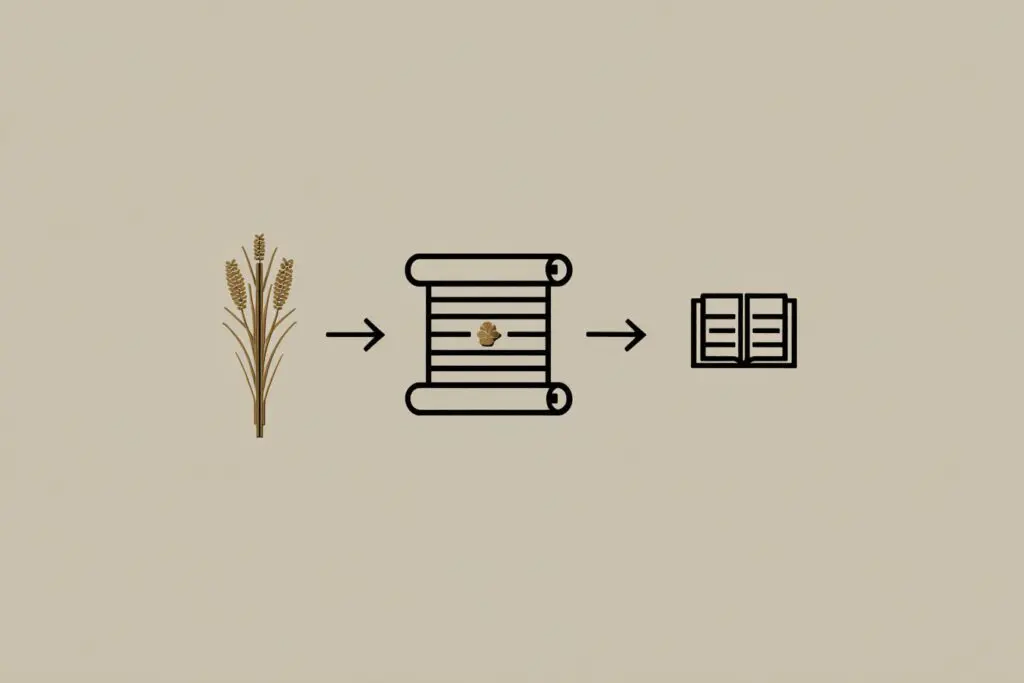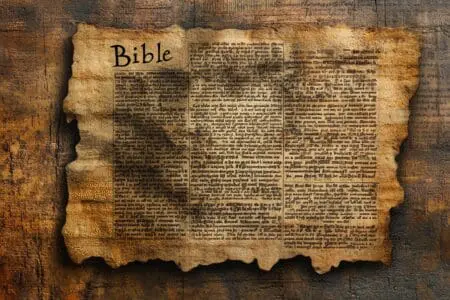Have you ever stopped to think about that word? Bible. It’s a word so common, so foundational to Christian faith, that we rarely give it a second thought. I know I didn’t for years. It was just… the Bible. The big book on the shelf, the one I took to church, the Word of God. But one day, the question popped into my head and wouldn’t leave: Why is it called the Bible?
It sounds like a simple question. But the answer isn’t tucked away in its pages. The book doesn’t name itself. The answer is a surprising journey through ancient history, involving busy port cities, stacks of papyrus scrolls, and a linguistic shift that changed how we see this sacred collection forever.
Most of us assume the name has some grand, theological origin. I certainly did. But the real story is far more grounded, more human. And honestly, I think it’s even more beautiful. It shows how God works through the everyday stuff of life—language, trade, and history—to preserve His Word.
More in Bible Category
What Bible Do Episcopalians Use
Who Wrote the First Five Books of the Bible
Key Takeaways
- The word “Bible” comes from the Greek phrase ta biblia, which means “the books.” It originally highlighted that the Bible is a collection or library of many different writings.
- This Greek term is linked to the ancient Phoenician port city of Byblos, which was a major center for the papyrus trade. Papyrus was the material used to make the “books” of the ancient world.
- Over time, through a shift in Latin, the plural “the books” (biblia) came to be understood as a singular noun, “the Book.” This reflects the theological understanding of the Bible as one unified message from God.
- Jesus and the early apostles never used the word “Bible.” They referred to the scriptures as “the Scriptures,” “the Law and the Prophets,” or “the Word of God.”
So, Where Did the Word ‘Bible’ Actually Originate?
The true origin of the word “Bible” has nothing to do with a divine decree and everything to do with ancient commerce. It’s a story that starts not in Jerusalem, but in a bustling port city on the coast of modern-day Lebanon.
The city was called Byblos.
Thousands of years ago, Byblos was a major hub for trade in the ancient world. And what was one of its chief exports? Papyrus. This reed, grown in the marshes of the Nile in Egypt, was processed into a thick, paper-like material—the primary medium for writing in the ancient Mediterranean. Scrolls, documents, and letters were all written on papyrus.
Because this city was so central to the papyrus trade, the Greeks, who were major importers, started associating the material itself with the city’s name.
From a City to a Scroll
Think of it like this: we call adhesive bandages “Band-Aids” or tissues “Kleenex.” The brand name becomes the name for the object. A similar thing happened here. The Greeks began using the word biblos to refer to a single papyrus scroll.
When they wanted to talk about multiple scrolls or books, they used the plural form: ta biblia.
And what does ta biblia mean in Greek?
“The books.”
That’s it. That’s the secret. The root of our word “Bible” is simply the ancient Greek phrase for “the books.” It wasn’t a holy name; it was a descriptive one. It accurately described a collection of many individual scrolls.
When I first learned this, I have to admit, it felt a little… underwhelming. I was looking for a deep, spiritual meaning. But the more I sat with it, the more profound it became. The name itself is a built-in reminder that what we hold in our hands is not a single, flat text. It’s a library.
How Did ‘The Books’ Become ‘The Book’?
This is where the story takes a fascinating turn. For early Greek-speaking Christians, referring to the collected scriptures as ta biblia (“the books”) made perfect sense. They had the scrolls of Isaiah, the letters of Paul, the Gospels, the Psalms. It was a collection.
But as Christianity spread into the Roman Empire, Latin became the dominant language of the church. When the term ta biblia was translated into Latin, it was written as biblia. Here’s the crucial part: in Greek, that “-a” ending signifies a plural. But in later, colloquial Latin, that same “-a” ending was understood as a feminine singular noun.
A simple linguistic shift had a massive theological impact.
Slowly but surely, over centuries, people stopped hearing “the books” and started hearing “the Book.” This change perfectly mirrored the Church’s growing understanding of the scriptures. While it was indeed a collection of many documents written by different authors over thousands of years, it was also something more.
It was one unified, coherent story. One book. One message from one God.
This shift from a plural to a singular concept is so important. It recognizes both the diversity and the unity of the Bible. It’s a library of 66 individual books, yet it is also the single, overarching Word of God. You can explore this rich history further through resources from academic institutions like Harvard’s exploration of The Bible: Its Origin and Growth.
What Did People Call the Scriptures Before the Word ‘Bible’ Was Common?
It’s easy for us to forget that for the first few centuries of the church, nobody was walking around with a leather-bound “Bible.” So, what did they call these sacred writings?
Did Jesus Ever Use the Word ‘Bible’?
Absolutely not. The term simply didn’t exist in that context yet. When Jesus wanted to refer to the Hebrew Scriptures (what we now call the Old Testament), He used the terms that were common among the Jewish people of His day.
You see Him do this all over the Gospels. He would say things like:
- “The Scriptures”: In John 5:39, He says, “You search the Scriptures because you think that in them you have eternal life; and it is they that bear witness about me.”
- “The Law and the Prophets”: This was a common way to refer to the entirety of the Hebrew canon. In Matthew 7:12, He says, “So whatever you wish that others would do to you, do also to them, for this is the Law and the Prophets.”
- “The Law of Moses and the Prophets and the Psalms”: In Luke 24:44, after His resurrection, the risen Christ gives an even more detailed breakdown, showing the three major sections of the Hebrew Bible.
He was speaking in the language of His people, referring to the scrolls they knew and revered.
What Terms Did the Early Christians Use?
The apostles and the early church fathers followed Jesus’ lead. They overwhelmingly used the Greek word graphē, which literally means “writing.” When you see the word “Scripture” in your New Testament, that’s almost always the word being used.
They saw their sacred texts—both the Hebrew Scriptures and the new apostolic writings that were circulating—as “the writings.” It was a term of reverence. These weren’t just any writings; they were the inspired, authoritative writings that revealed God.
The term “Word of God” (logos tou theou) was also used, but it often referred to the proclaimed message, the Gospel itself, not just the written text. The two were, of course, deeply intertwined.
Does the Bible Itself Tell Us What to Call It?
This is a great question. While the Bible doesn’t give itself a formal title, it constantly talks about its own nature and purpose. It is self-referential. It tells us what it is.
2 Timothy 3:16 is probably the most famous example: “All Scripture is breathed out by God and profitable for teaching, for reproof, for correction, and for training in righteousness.”
Here, the Apostle Paul uses that word “Scripture” (graphē). He doesn’t say “the Bible,” but he defines the very essence of what the Bible is: God-breathed. Inspired.
So, while the physical name “Bible” comes from the world of commerce and language, the spiritual identity of the book comes from within its own pages. It testifies to its own divine origin. I find that so powerful. Men handled the papyrus and the ink, and human language gave it a name, but the author behind it all was God.
Why Is Understanding the Origin of the Name So Important for Christians Today?
Okay, so this is a neat bit of historical trivia. But does it actually matter? Does knowing “Why is it called the Bible?” change anything about our faith?
I believe it does. Deeply.
When I was first digging into this, I spent a lot of time in heavy theology books. But the real answer, as I mentioned, wasn’t just there. It was in the history of trade, language, and how everyday people lived. And realizing that helped me see the Bible not as a book that dropped out of the sky, but as a book that God wove into the very fabric of human history.
How Does Knowing ‘Bible’ Means ‘Books’ Change How We Read It?
Remembering that the Bible is ta biblia—”the books”—is one of the most helpful tools for reading it well. It protects us from making the mistake of treating it all the same.
When you go to a library, you don’t read a history book the same way you read a book of poetry. You don’t interpret a law text the same way you interpret a personal letter. You respect the different genres. We should give the Bible the same courtesy.
Knowing its name means “the books” encourages us to appreciate its incredible diversity:
- Law: We find the foundational legal and covenantal codes in books like Leviticus and Deuteronomy.
- History: We read the sweeping narrative of God’s people in Genesis, 1 & 2 Kings, and Acts.
- Poetry: We find the emotional heart of the human experience in Psalms, Song of Solomon, and Lamentations.
- Wisdom Literature: Books like Proverbs and Ecclesiastes offer profound insight into living a godly life.
- Prophecy: Prophets like Isaiah and Jeremiah delivered God’s message to His people.
- Gospels: These are unique biographical accounts of the life and ministry of Jesus.
- Epistles (Letters): We get to read the personal correspondence of apostles like Paul and Peter, guiding the early churches.
- Apocalyptic Literature: Books like Daniel and Revelation use vivid, symbolic imagery to reveal God’s ultimate sovereignty.
When we flatten all of this into one genre, we misunderstand and misapply so much of God’s Word. The name itself—Bible—is a quiet invitation to be a better reader.
Does Its Earthly Name Diminish the Bible’s Authority?
Some people might feel uncomfortable with this. The idea that the holy book gets its name from a regular, old seaport that sold papyrus might seem to cheapen it.
I see it the exact opposite way.
To me, it is a stunning testament to the doctrine of Incarnation. God became flesh and dwelt among us in the person of Jesus. He didn’t stay distant and removed; He entered into our messy, ordinary world. He used a manger, a fishing boat, spit and mud.
In the same way, God delivered His Word to us. He didn’t use a magical, alien language. He used Hebrew, Aramaic, and Greek. He didn’t use angel feathers for paper; He used papyrus scrolls traded in a port city. He allowed His collection of sacred books to be given a name born from human language and commerce.
God is not afraid of the ordinary. He sanctifies it. He uses it for His glorious purposes.
The earthly origin of the name “Bible” doesn’t diminish its divine authority one bit. Instead, it shows us a God who is willing to meet us where we are, to use our history, our languages, and our world to communicate His timeless truth to us.
That humble, surprising origin story is, for me, just one more reason to stand in awe of the book we call the Bible. It’s a reminder that every time we open its pages, we are holding a library of books that is also the one, unified Book from the God who stepped into history.
Frequently Asked Questions – Why Is It Called the Bible

Why do we sometimes refer to other books as a ‘Bible’ today?
Today, the word ‘Bible’ is used metaphorically to signify any book that is considered the ultimate authority or guide on a particular subject, reflecting the historical perception of the Bible as a trusted and authoritative collection of writings.
How did technology, like the invention of the codex, affect the naming of the Bible?
The invention of the codex, a type of book with pages instead of scrolls, made it easier to compile and access texts, reinforcing the concept of a single, unified book. This technological change helped solidify the name ‘Bible’ as a singular book, emphasizing its role as a comprehensive, authoritative text.
What is the significance of the Greek word ‘ta biblia’ in the history of the Bible’s name?
‘Ta biblia’ was the Greek term for ‘the books’ or ‘the scrolls’. It was a common term for any collection of writings. Over time, it came to specifically denote the collection of sacred writings, and through a linguistic shift, was ultimately understood as ‘the Book’ or ‘the Bible’.
How did the city of Byblos influence the name of the Bible?
Byblos was known as the leading supplier of papyrus, a writing material. The Greek word for papyrus, derived from Byblos, was used to refer to a set of documents or scrolls, which later became associated with the sacred texts, eventually leading to the name ‘Bible’.
Where does the word ‘Bible’ originate from?
The word ‘Bible’ originates from the ancient port city of Byblos in Lebanon, which was a major centre for trading papyrus, the material used for writing in ancient times. The name evolved through a series of linguistic and technological changes over thousands of years.




